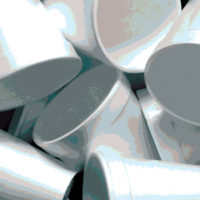Kellogg’s Bear Naked Supports Sustainability and Recycling Goals

Kellogg’s Bear Naked granola brand features the first fully recyclable, food-grade, standup pouch on the market in the U.S. Its creation was no small feat. A typical standup pouch is kind of complex:
There are multiple layers.
It’s not the easiest to recycle.
And if you want to fill it with food, well…it requires a delicate balance between a slew of factors that our Bear Naked team learned about when it started down this road in 2017.
Bear Naked has always been concerned about sustainability. In 2008, the brand began to use a recycling process whereby customers could sign up for a special program to ship their empty Bear Naked granola bags away for recycling.
But that isn’t the most convenient option, so we set out to solve that almost 2 years ago. We wanted to create the first food-grade standup pouch that a customer could drop off at the store to be recycled. At the same time, the new pouch had to keep the granola fresh, not compromise the taste, and maintain its sleek shelf appearance.
So, we started by collaborating as much as possible internally at Kellogg. We immersed our internal food safety team on the project, explained what we were doing—why we were doing it—and engaged our quality control team to work through manufacturing expectations and challenges.
Then we approached our suppliers.
I remember when I went to Dow, our materials science partner, to pitch the idea.
Dow had a lot of great relationships with non-food consumer product goods companies at the time. In fact, when I showed up at the building, I saw a lot of references to Cascade and Seventh Generation. Dow is great at putting dishwasher tabs in recyclable standup pouches.
Food was going to be a bit different.
I stood up and talked to a room full of engineers about granola for about 45 minutes (which I’m sure was 30 minutes too much for some of them). I explained the importance of targeted shelf life, food safety and quality standards—and how if we missed the mark on any of it, we’d have to go back to the drawing board.
Then we invited the Dow team and one of our other packaging suppliers to our plant so they could see the entire process, the end game.
This was really the key.
They studied our manufacturing lines and talked to our operators. Even before we started testing the new pouch, Dow’s engineers asked our people about existing challenges to running the lines. This gave us a leg up on testing—and prevented a bunch of needless experimentation that likely would’ve involved wasted product and time.
But we still had our challenges.
The first involved the pouch’s zipper, which turned out to require the longest period of development.
There’s an off-the-shelf base material that the supplier, Presto, creates for most customers. We found it wasn’t working for us from a sealing process, so Berry, a packaging manufacturer, tweaked the regular formulation for it to work in our plants.
It was all about balance.
The plastic had to withstand the right amount of heat during the manufacturing process. If it required too much heat to seal the zipper, we’d risk damaging the rest of the pouch (and perhaps even burning through the food).
Not enough heat, and the zipper wouldn’t seal. Which would be a food safety issue, of course.
It took months of collaboration and creativity, but we finally landed on a zipper that seals at lower temperatures in a shorter amount of time. Perfect for manufacturing.
I mentioned Bear Naked’s sleek shelf appearance earlier.
That was another challenging factor. How do we use the right recyclable materials that also make the bag stand at attention on the store shelf? And consumers have told us that they like to see the food they’re buying in the bag. Thus, the clear window that you see on Bear Naked pouches. Thus, another aspect that took some testing and retesting to perfect.
But we eventually did.
And again, it wouldn’t have been possible without our team’s commitment to collaboration. And by “team,” I mean everyone on all sides: Dow, Berry, Kellogg’s manufacturing, quality, food safety, and packaging teams.
The end-to-end collaboration on this project was unique. Better than I’ve ever seen in my career. And because of it, Bear Naked and Kellogg created a new chapter in our commitments to sustainability. I’m proud of that.
These days, it’s such a thrill when I scroll through my Instagram feed and see consumers filming themselves recycling the pouch and tagging Bear Naked in the videos. Not only because they’re able to recycle more easily, but because they still crave our food.
In the end, it’s really all about the food—and that’s what makes me proudest to be part of this project.
We always kept the quality and safety of the food in the forefront.
Shannon Moore is the lead packaging engineer at the Kellogg Company.
Looking for a reprint of this article?
From high-res PDFs to custom plaques, order your copy today!






